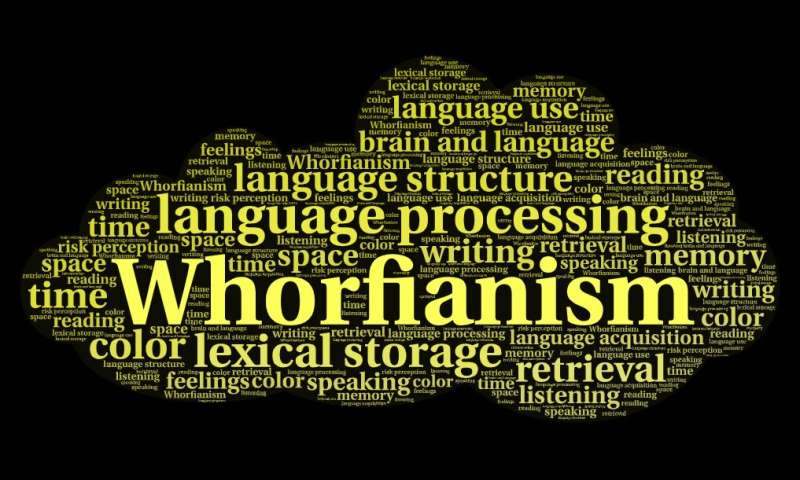Emergency communications, second languages and hurricane season

To what extent is the way we think influenced by the language we speak? That is the core question of a research area called linguistic relativity, also known as Whorfianism. Although there has been growing evidence that almost half of the human perception is processed by linguistic filters, the application of linguistic relativity remains very limited in other fields outside linguistics and psychology.
That made us wonder about the possible implications of this within our field of study, emergency communication. In a recently published study, we went beyond translation issues and explored the psychological dimension of local emergency communication in English and compared it to nine other languages.
Emergency communication is all about using numbers, movements, expressions, shapes and colors to spread timely information in the form of warnings and directives. But when we decide to have an emergency communication system, we usually adopt a preexisting one, simply because it's cheaper this way! But the real question here is: What, exactly, are we risking by overlooking the linguistic variations? And how significant can these variations be?
To answer these questions, we interviewed bilinguals from Florida, and our data spotted considerable variations in the way people perceive local emergency communication based on their mother language. Such variations can easily and significantly influence people's behavior during emergencies.
How can language influence our understanding of emergency communication?
Listening to or reading a sentence in your second language is less accurate compared to your first language, and that gets worse during stressful times. So if we communicate with people using their second language about an approaching hazard, they may not receive it correctly and follow wrong procedures as a result.
Making a decision in a second language also underweights losses and gains, which means people may underweight the consequences of an approaching hazard. So they choose not to prepare for it. Other studies have shown that a second language is associated with less moral evaluation toward actions, which can influence post-disaster behaviors, especially when it comes to helping others.
Besides the use of the language, most emergency communication systems rely heavily on color-coding, and assume that all people view colors in the same way. Research has shown that if you don't have a word for a certain color in your language, you may not be able to see it! People from Namibia speaking the Otjihimba language are literally unable to see Blue, because they don't have a word for the color in their language.
Similarly, we usually assume a global understanding of numbers. Still, research has also shown that our perception of numbers varies based on our language, and that variations can sometimes be extreme! People from Brazil speaking the Múra-Pirahã language face difficulties distinguishing between numbers like 10 and 15, because they have no words for these numbers in their language.
Language can also affect our sense of direction. While we might say in English "The escape stair is to the right of the elevator," in other languages, like Guugu Yimithirr in Australia, that is not enough: Yimithirr people need to be more specific, so they would say, "The escape-stair is on the southwest of the elevator." Sometimes, the language structure itself can be a source of confusion as well; saying "Fire again house at started" may not make sense for many of us, but the words are in the right order in Korean.
The problem doesn't end there. We found similar variations in sense of time, emotional intelligence, gender realization and memorizing abilities, and all of that can greatly influence people's behavior during emergencies. Our data is limited to 10 languages in total, out of thousands of other languages spoken worldwide, so we are only getting the ball rolling in here!
Moving toward a more inclusive and equitable emergency communication
Today, the global trend is to try unifying systems in order to reduce cost. That can be seen in emergency communication within language standardization strategies that aim for faster information transfer. But is fast all that we need? What about accuracy? When an institution adopts one communication language, it faces a significant loss of performance. That's why we have to be mindful of these consequences of unifying communication, especially when research shows that unified communication creates a higher sense of rejection.
Customization is no longer a luxury; it's a necessity. We need to design our communication systems around the people we are trying to communicate with, including the millions of people in the U.S. who speak English as a second language. We have to carry out orderly evaluations for the current communication systems to see how people get and understand warning messages. It is not enough simply to establish a communication system thinking it is good enough; we need to continuously rethink about how to make it better.
This story is part of Science X Dialog, where researchers can report findings from their published research articles. Visit this page for information about ScienceX Dialog and how to participate.
More information:
Amer Hamad Issa Abukhalaf et al, Psycholinguistics and emergency communication: A qualitative descriptive study, International Journal of Disaster Risk Reduction (2021). DOI: 10.1016/j.ijdrr.2021.102061
Bio:
Amer Hamad Issa Abukhalaf is a Ph.D. Candidate at the Design, Construction, and Planning College, at the University of Florida. Amer works as a research assistant at the Florida Institute for Built Environment Resilience (FIBER), and he researches disasters with a focus on emergency communication.
Jason von Meding is an Associate Professor at the University of Florida and a founding faculty member of the Florida Institute for Built Environment Resilience (FIBER). He researches disasters – particularly how injustice and inequality are the fundamental drivers of risk in society, and therefore shape disaster impacts. As part of his focus on public facing science communication, he is co-host of the Disasters: Deconstructed Podcast and tweets @vonmeding.